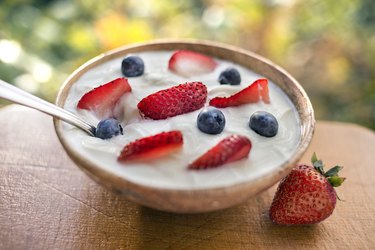
Dr. Younan Nowzaradan is the founder of the self-titled Dr. Now diet. It's the same eating program he prescribes to his patients as they prepared for weight-loss surgery on the reality TV show My 600-lb Life.
We asked dietitian and weight-loss expert Lauren Harris-Pincus, RDN, founder of Nutrition Starring You and author of The Everything Easy Pre-Diabetes Cookbook, to share her thoughts on the Dr. Now diet. She covers both the good and the bad — and why most people will want to steer clear of this diet.
Video of the Day
What Is the Dr. Now Diet?
The intention of the Dr. Now diet is to help people with obesity to lose pounds before weight-loss surgery. Losing weight before this type of procedure makes the operation safer and reduces the risk of post-op complications, according to Penn Medicine.
There are three main weight-loss procedure options, according to the National Institute of Diabetes and Digestive and Kidney Diseases (NIDDK):
- Gastric sleeve: With this procedure, most of the stomach is removed, leaving a small, banana-shaped organ that is closed with staples. Essentially, this new stomach is smaller, so you fill up faster on a smaller volume of food.
- Gastric bypass: With this surgery, the stomach is again reduced in size by using staples to create a small pouch, but the small intestine is also divided into two parts — an upper and lower section. The lower section is connected to your (new) small, stomach pouch. This allows food to bypass most of your stomach and the upper section of your small intestines, leading to fewer calories absorbed. The top section of your small intestine is connected to an area found further down the lower portion of the small intestine. This allows digestive juices to flow directly to the lower part of the intestine, to assist in digestion. This procedure is also referred to as Roux-en-Y gastric bypass.
- Adjustable gastric band: This procedure is less common in the U.S. because it comes with a higher risk for complications. Here, an inflatable band is placed around your stomach, allowing for a smaller pouch to be created. The band is filled with saline solution and the surgeon can use saline to increase or decrease the size of the band via a port placed under the skin.
How Does It Work?
The Dr. Now diet focuses on three factors that affect our calorie intake. Dr. Nowzaradan refers to these factors as F.A.T., which is an acronym for frequency, amount and type.
The Dr. Now diet provides recommendations for these three aspects:
- Frequency: Eat two to three times per day; avoid snacking in between meals.
- Amount: Limit calorie intake to 1,200 calories per day and aim for 400 calories at each meal.
- Type: Eat foods that are low in calories and carbohydrates while high in fiber, protein and nutrients.
To prepare for weight-loss surgery, patients are asked to follow the F.A.T. guidelines of the Dr. Now diet. From there, patients are instructed to follow three steps as outlined in the book Dr. Nowzardan Diet Plan Book for Beginners:
- Make a list of their favorite breakfast, lunch and dinner foods.
- Remove all high-calorie foods from the list.
- Mix and match foods remaining on the list to create 400-calorie meals.
Proposed Benefits of the Dr. Now Diet
The Dr. Now diet has some potential benefits, but they come at a risk.
1. Promotes Weight Loss
For most adults, especially those with a larger body, eating just 1,200 calories per day means eating at a calorie deficit. And when you're eating fewer calories than your body burns, you will lose weight. And because the calorie amount is so low, the weight loss will likely be rapid, especially at first.
2. Reduces Risk of Post-Op Complications
Losing weight prior to weight-loss surgery is typically not required or a standard in any guidelines, but research shows doing so may reduce the post-operative mortality rate. A May 2020 study in the Journal of the American Medical Association found that even moderate weight loss, e.g., less than five percent of your body weight, can lower the risk of death after surgery.
3. Focuses on Nutrient-Rich Foods
"The Dr. Now diet is based on nutrient-dense whole foods, something that should form the base of any healthy diet," Harris-Pincus says.
But that is where the benefits of the nutritional quality of the diet peter out.
"If the diet was expanded to include similar foods at a higher calorie level plus add-ins like nuts, seeds, heart-healthy oils and some whole grains, it could work in the long term as long as there is some room for indulgences," Harris-Pincus says.
Risks of the Dr. Now Diet
As with many diets, there are some potential risks with the Dr. Now diet, including:
1. Nutrient Deficiencies
It's tough to meet your nutritional needs when you're eating only 1,200 calories per day, especially when doing so means cutting out foods that might be high in healthy fats, which help with the absorption of some crucial vitamins and minerals.
"The diet is super restrictive and bans some very healthy, nutrient-dense foods like eggs, nuts, olive oil, certain fruits, potatoes and oatmeal," Harris-Pincus says.
2. Sustainability
"A diet this restrictive doesn't reasonably allow for enjoying foods at life events like holidays, weddings and other celebrations with family and friends. It's also difficult to stick to when traveling or dining out," Harris-Pincus says.
Foods to Eat
Add these foods to your Dr. Now diet food list:
Fruit and Vegetables
All vegetables are allowed except for potatoes. Stick to whole fruits (no juice) except for cantaloupe, mangoes, pineapple and banana.
- Apples
- Asparagus
- Blueberries
- Broccoli
- Kale
- Onion
- Orange
- Peppers
- Raspberries
- Strawberries
Grains
Whole-grain carbs are allowed, such as:
- Amaranth
- Barley
- Millet
- Whole-wheat pasta
Nuts and Seeds
- Chia seeds
- Flax seeds
Nonfat Dairy
- Fat-free yogurt
- Fat-free cottage cheese
- Skim milk
Lean Proteins
- Egg whites
- Fish
- Chicken breast
- Lean cuts of meat
- Tofu
Zero-Calorie Sweeteners
- Stevia
- Monk fruit
Foods to Avoid (or Limit)
Keep these foods off your Dr. Now foods shopping list.
Fruit and Vegetables
- Banana
- Canned fruit
- Cantaloupe
- Fruit juice
- Mango
- Pineapple
- Potatoes
Grains
- Cereal
- Crackers
- Chips
- Pancakes
- Pasta
- Rice
- White bread
Nuts and Seeds
- Nut butter
- Most nuts: almonds, cashews, pistachios and walnuts
Full-Fat Dairy
- Full-fat cheese
- Ice cream
- Sweetened yogurt
- whole milk
Protein Sources
- Eggs
- Fried meats
- Fatty meats
- Processed meats
Sugary Foods and Sweeteners
- Agave
- Candy
- Baked goods
- Doughnuts
- Granulated sugar
- Honey
- Maple syrup
Dr. Now Diet: Sample Meal Plan
If you're following the Dr. Now diet under medical supervision, consider trying this meal plan featuring Dr. Now diet-approved recipes.
Day 1
- Breakfast: Egg White Veggie Omelet and 1 cup fresh raspberries
- Lunch: Tuna and Feta Cheese Salad topped with 1/2 cup cooked barley
- Dinner: Lemony Charred Greek Tofu Kebabs
Day 2
- Breakfast: Vegan Curry Sunrise Scramble
- Lunch: Arugula and Cherry Tomato Salad topped with 4-ounce grilled chicken breast
- Dinner: Simple Broiled Cod and 1/2 cup whole-wheat pasta
Day 3
- Breakfast: Everyday Green Smoothie and 1/2 cup plain, fat-free Greek yogurt
- Lunch: Dijon Tuna Bites and 1 orange
- Dinner: Quinoa and Tofu Stuffed Pepper
The Bottom Line
This diet may be appropriate for some folks, but only under certain conditions.
"This diet is extremely restrictive and is meant to be followed short term, and under medical supervision for people with extreme obesity, who are preparing for bariatric surgery," Harris-Pincus says. "As a temporary pre-op diet, the benefit might outweigh the risks, but that does not hold true for everyone looking to lose weight."
- Journal of the American Medical Association: "Association of Preoperative Body Weight and Weight Loss With Risk of Death After Bariatric Surgery." May 2020.
- "Dr. Nowzaradan Diet Plan Book For Beginners". 2022.
- Penn Medicine: "I Lost Weight Before Weight-Loss Surgery: Should I Still Have the Surgery?"


